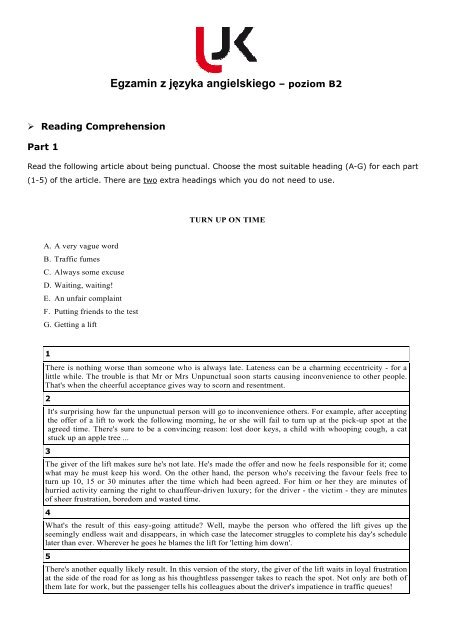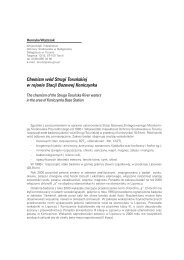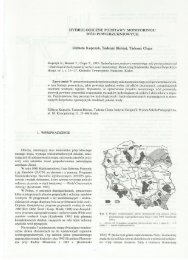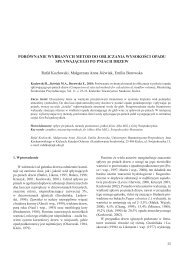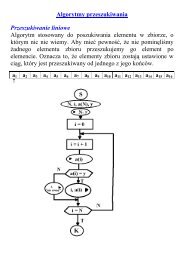Egzamin z języka angielskiego – poziom B2 - UJK
Egzamin z języka angielskiego – poziom B2 - UJK
Egzamin z języka angielskiego – poziom B2 - UJK
You also want an ePaper? Increase the reach of your titles
YUMPU automatically turns print PDFs into web optimized ePapers that Google loves.
� Reading Comprehension<br />
Part 1<br />
<strong>Egzamin</strong> z <strong>języka</strong> <strong>angielskiego</strong> <strong>–</strong> <strong>poziom</strong> <strong>B2</strong><br />
Read the following article about being punctual. Choose the most suitable heading (A-G) for each part<br />
(1-5) of the article. There are two extra headings which you do not need to use.<br />
A. A very vague word<br />
B. Traffic fumes<br />
C. Always some excuse<br />
D. Waiting, waiting!<br />
E. An unfair complaint<br />
F. Putting friends to the test<br />
G. Getting a lift<br />
1<br />
TURN UP ON TIME<br />
There is nothing worse than someone who is always late. Lateness can be a charming eccentricity - for a<br />
little while. The trouble is that Mr or Mrs Unpunctual soon starts causing inconvenience to other people.<br />
That's when the cheerful acceptance gives way to scorn and resentment.<br />
2<br />
It's surprising how far the unpunctual person will go to inconvenience others. For example, after accepting<br />
the offer of a lift to work the following morning, he or she will fail to turn up at the pick-up spot at the<br />
agreed time. There's sure to be a convincing reason: lost door keys, a child with whooping cough, a cat<br />
stuck up an apple tree ...<br />
3<br />
The giver of the lift makes sure he's not late. He's made the offer and now he feels responsible for it; come<br />
what may he must keep his word. On the other hand, the person who's receiving the favour feels free to<br />
turn up 10, 15 or 30 minutes after the time which had been agreed. For him or her they are minutes of<br />
hurried activity earning the right to chauffeur-driven luxury; for the driver - the victim - they are minutes<br />
of sheer frustration, boredom and wasted time.<br />
4<br />
What's the result of this easy-going attitude? Well, maybe the person who offered the lift gives up the<br />
seemingly endless wait and disappears, in which case the latecomer struggles to complete his day's schedule<br />
later than ever. Wherever he goes he blames the lift for 'letting him down'.<br />
5<br />
There's another equally likely result. In this version of the story, the giver of the lift waits in loyal frustration<br />
at the side of the road for as long as his thoughtless passenger takes to reach the spot. Not only are both of<br />
them late for work, but the passenger tells his colleagues about the driver's impatience in traffic queues!
� Reading Comprehension<br />
Part 2<br />
Read the following text and choose A, B or C.<br />
It had been a long, hard, wonderful day. The two of us had walked from the sea's edge through the length of a beautiful<br />
valley, climbed a superb mountain, traversed its narrow, rocky ridge, and now stood on its final peak, tired, happy and<br />
looking for the perfect camp site.<br />
The experienced backpacker has a natural feeling for such things, and our eyes were drawn to a small blue circle on<br />
the map, like an eye winking at us. We could not see it from where we were, but we followed our judgement and<br />
descended steeply until it came into view.<br />
We were right. It was a calm pool, with flat grass beside it. Gently taking our packs off, we made the first of many<br />
cups of tea before pulling up our lent. Later that evening, over another cup of tea and after a good meal, we sat outside<br />
the tern watching the sun set over a glittering sea dotted with islands, towards one of which a ferry was slowly moving. It is<br />
not always so perfect, of course. On another trip, with a different companion, a thoroughly wet day had ended at a lonely<br />
farm. Depressed at the thought of camping, we had knocked and asked if we could use a barn as a shelter.<br />
The speed at which the backpacker travels makes this the perfect way to see any country. You experience the landscape as<br />
a slow unfolding scene, almost in the way it was made; and you find time to stop and talk to people you meet. I've learned<br />
much local history from simply chatting to people met while walking through an area. At the end of a trip, whether three days<br />
or three weeks, there's a good feeling of achievement, of having got somewhere under your own power.<br />
After years of going out walking just for the day, many people start backpacking simply through wanting to stay out<br />
rather than cut short a trip.<br />
There is one important rule the good backpacker should follow: respect the land and its people - as the Americans<br />
say, 'take only photographs (one might add memories), leave only footprints'.<br />
With good equipment, you can survive just about anything the weather can throw at you - and modern equipment is<br />
very good indeed. Of course, you need to know how to use it - go to a specialist outdoor shop for good advice. In<br />
particular, you need to be confident in map reading.<br />
As with any other sport, start gently and locally, improve your skills and gradually widen your horizons. Britain is<br />
only crowded in patches and there is still plenty of space for the backpacker wanting to be alone.<br />
6. The writer and his companion knew there was a pool because<br />
a. they had seen it earlier in the day.<br />
b. they had been told about it.<br />
c. they could see it on the map.<br />
7. How did they feel at the end of the day?<br />
a. They wished they could have found a farm.<br />
b. They were delighted with the spot they'd found.<br />
c. They were anxious about the weather to come.<br />
8. According to the writer, the main advantage of backpacking is that you can<br />
a. find out how the landscape was made.<br />
b. gain an understanding of the area you walk through.<br />
c. make new friends while walking.<br />
9. What advice does the writer give about backpacking?<br />
a. You should take lots of photographs to remind you of your trip.<br />
b. You should avoid spending too much on equipment.<br />
c. You should first walk in an area you are familiar with.<br />
10. What difference between backpacking and walking does the writer mention?<br />
a. Backpackers travel in pairs or groups.<br />
b. Backpackers never sleep indoors.<br />
c. Backpackers' walks last longer than a day.
� Reading Comprehension<br />
Part 3<br />
Read the following 4 texts (A-D) and match them with the 8 questions (11-18).<br />
Which programme:<br />
A<br />
11 gives you recipes from different parts of the world every week?<br />
12 is set in different places?<br />
13 may soon be shown more frequently?<br />
14 involves the presenter's family?<br />
15 tells you about things that can go wrong?<br />
16 gives information about food production?<br />
17 cannot be seen in every television area at the moment?<br />
18 looks at different ways of using one particular food?<br />
March's food, health and fitness on the box<br />
FOOD FILE<br />
Food File tells you exactly what goes into the food on your plate, as the programme follows it from farmyard<br />
to factory and finally to your front door. Nutritionist Amanda Ursell returns on Wednesday to present a third series<br />
of the popular programme that leaves no lid unlifted and no dishcloth unturned. Last time she told us about the<br />
killer bug that lives in hamburgers, asked why we don't always get a good deal from restaurants, complained<br />
about cookery writers whose recipes don't work and told us about a new approach to dieting. Plus, there are<br />
recipes from around the world as a regular feature.<br />
OU CAN COOK<br />
YOU CAN COOK<br />
B<br />
Who can bone a chicken in 30 seconds or less, create a Chinese banquet before your eyes and tell you all<br />
there is to know about Asian cuisine? Yan can! Chinese-American chef Martin Yan - cookery teacher, cookbook<br />
author and host of the hit ITV afternoon series You Can Cook - has been seen on nearly all the ITV regions in<br />
recent years. Just lately he's been seen once a week in the Anglia and Central regions. If he isn't on your screen<br />
right now, he soon will be again. Martin is seen preparing dishes with an Oriental touch, assisted each week by a<br />
different guest such as San Francisco Thai cooking expert Joyce Jue or sausage expert Bruce Aidells. Even his<br />
mother and his uncle get in on the act.<br />
HEALTH WATCH<br />
HEALTH WATCH<br />
C<br />
Latest ideas on the health front are the subject of this new monthly programme which began in December as<br />
part of Sky News and is now likely to go fortnightly. The series kicked off with reports on noise pollution, doctors<br />
who leave Britain, eye surgery, hospital waiting lists and predicting heart attacks by computer. Presenter Nicola<br />
Hill recently introduced another welcome idea from the medical hotline - doctors who prescribe exercises instead<br />
of drugs.<br />
D<br />
A TASTE OF AFRICA<br />
Presenter Dorinda Hafner cooks nesting pigeons - a favourite recipe from her childhood - when she visits<br />
Egypt for her Channel 4 series. Continuing on Wednesdays until March 23, the programme takes viewers to<br />
Tanzania for a four-course meal featuring bananas in every course, plus banana wine to wash it down, and to<br />
Zanzibar where visitors can try a lipstick straight from the lipstick tree. In Mali, Dorinda visits the River Niger to<br />
see the hippo, the country's national symbol, and cook a fine freshwater fish, the capitaine. And there's another<br />
series to come later in the year.
� Language Elements<br />
Part 1<br />
For questions 19-28, read the text below and decide which answer A, B or C best fits each space. Mark<br />
your answers on the separate answer sheet.<br />
THE SECRETS OF SPEECH<br />
The study of speech is a fascinating topic for research. Scientists (19)…to unravel the workings of the human brain<br />
have discovered for the first time how it picks out speech from (20)… noises and works out (21)… just the<br />
meanings of words. As Britain’s research councils launch a push to understand exactly (22)…makes humans<br />
master communicators, the results so far are startling.<br />
What has puzzled researchers over the years is how we are so good (23)… language and are able to convey and<br />
perceive (24)… not just by using words, but with more subtle devices (25)… as intonation and rhythm. Among the<br />
big guns rolled out by researchers to crack the mystery of human language is the brain scanning technique called<br />
fMRI. Able to take snapshots of brain activity, fMRI gives a fascinating insight (26)…the inner workings of the<br />
brain. Using fMRI, Dr Sophie Scott, an expert in speech neurobiology, (27)…discovered that the brain takes speech<br />
and separates it into words and ‘melody’. Her studies suggest that words are then moved over to the left temporal<br />
lobe for processing, (28)…the melody is channeled to the right side of the brain, a region more stimulated by<br />
music.<br />
19. a) trying b) try c) tried<br />
20. a) another b) other c) others<br />
21. a) as much as b)most of c) more than<br />
22. a) whether b) that c) what<br />
23. a) in b) at c) for<br />
24. a) informations b) information c) an information<br />
25. a) such b) so c) similar<br />
26) a) around b) over c) into<br />
27. a) was b) has c) having<br />
28. a) since b) during c) while<br />
� Language Elements<br />
Part 2<br />
For questions 29-38, read the text below and decide which of the words or phrases best fit each space. Use only one word<br />
in each space. Mark your answers on the separate answer sheet.<br />
FIT FOT SPORTS<br />
It’s not always easy to decide which sport to (29) … up. When choosing, it is important to remember,<br />
that excellence in sports results (30) … a number of factors. For some sports, the body shape and<br />
structure with (31) … you are born are important. Top runners are typical examples of individuals (32)<br />
… have selected a sport because of their natural body type. Many other sports are more dependent<br />
(33) … training and technique, and anyone following a well-structured and appropriate training<br />
programme should do well.<br />
The aim of all sports training (34) … to improve fitness and skills, and to develop training programmes<br />
that are both safe (35) … effective. To do (36) … properly, an understanding of (37) … physical<br />
demands of sport is needed. All sports require a combination of strength, speed, endurance, agility and<br />
flexibility to varying degrees. Other factors to be (38) … into account in a training programme are diet,<br />
the importance of avoiding injuries, your general state of health, and the nature and role of other team<br />
players.<br />
FOR * IS *AT * THE * TAKEN * OF * AND * THIS * WHO * ON * WHICH * FROM * TAKE * WHAT * IN
� <strong>B2</strong> Listening<br />
Part 1<br />
You will hear a radio interview with Mike Reynolds, whose hobby is exploring underground places such<br />
as caves. For questions 39-43, complete the sentences.<br />
39. Cavers explore underground places such as mines and _________ as well as caves.<br />
40. In the UK, the place Mike likes best for caving is _________ .<br />
41. As a physical activity, Mike compares caving to _________.<br />
42. Cavers can pay as much as £20 for a suitable _________ .<br />
43. Mike recommends buying expensive _________ to avoid having accidents.<br />
� <strong>B2</strong> Listening<br />
Part 2<br />
You will hear an interview with a man called Stan Leach who is talking about adventure sports. For<br />
questions 44-53 decide whether the statements are true or false (T/F)<br />
44. Stan says that the best thing about walking is that you can please yourself how you do it.<br />
45. Stan's opinion on scrambling is that people doing it may need to be accompanied.<br />
46. Stan discovered when he went climbing that it was harder than he expected.<br />
47. Stan thinks that mountain biking is more expensive in Britain than elsewhere.<br />
48. Stan's advice on scuba diving is that it is easier than it seems.<br />
49. Stan’s opinion is that skydiving is surprisingly popular.<br />
50. Stan’s opinion is that canoeing is best at certain times of the year.<br />
51. Stan says that the best thing about walking is that you can get fit by doing it.<br />
52. Stan's opinion on scrambling is that it is unsuitable for beginners.<br />
53. Stan thinks that mountain biking is best where there lots of slopes.
� <strong>B2</strong> Listening<br />
Part 3<br />
You will hear people talking in four different situations. For questions 54-57, choose the best<br />
answer (A, B or C).<br />
54. You overhear a young man talking about his first job. How did he feel in his first job?<br />
a. bored<br />
b. confused<br />
c. enthusiastic<br />
55. You hear a radio announcement about a dance company. What are listeners being invited to?<br />
a. a show<br />
b. a talk<br />
c. a party<br />
56. You overhear a woman talking to a man about something that happened to her. Who was she?<br />
a. a pedestrian<br />
b. a driver<br />
c. a passenger<br />
57. You hear a woman talking on the radio about her work making wildlife films. What is her main<br />
point?<br />
a. Being m the right place at the right time is a matter of luck.<br />
b. More time is spent planning than actually filming.<br />
c. It is worthwhile spending time preparing.
� <strong>B2</strong> WRITING<br />
Choose one of the topics below.<br />
Writing 1<br />
You have seen this advertisement for a job in the USA in an international magazine.<br />
USA SUMMER CAMPS<br />
If you can speak English and are cheerful, energetic and hardworking, you are the right person for us.<br />
Food and accommodation are provided. You just pay the air fare.<br />
You will<br />
-look after children aged 8-12<br />
-help organise sports and evening activities<br />
-work in the kitchens<br />
Write to the director, Mrs Connor, and explain why you would be a suitable person for the job.<br />
Write a letter of application (150-200 words).<br />
Writing 2<br />
You have just had a disgusting meal at an expensive restaurant. When you tried to complain, the waiter was rude to<br />
you. Write a letter of complaint to the manager (150-200 words). Include the following points:<br />
- explain why you are writing<br />
- complain about the food and the service<br />
- ask for some actions to be taken
READING COMPREHENSION<br />
1. F<br />
2. C<br />
3. D<br />
4. E<br />
5. B<br />
6. C<br />
7. B<br />
8. B<br />
9. C<br />
Language Elements, Part 1<br />
19) a 20) b 21) c 22) c 23) b 24) b 25) a 26) c 27) b 28) c<br />
Language Elements, Part 2<br />
29. take<br />
30. from<br />
31. which<br />
32. who<br />
33. on<br />
34. is<br />
35. and<br />
36. this<br />
37. the<br />
38. taken<br />
Listening KEY<br />
39. tunnels<br />
40. Wales<br />
41. climbing<br />
42. (hard) hat<br />
43. (strong) boots<br />
44. T<br />
45. T<br />
46. F<br />
47. F<br />
48. T<br />
49. T<br />
50. F<br />
51. F<br />
52. F<br />
53. F<br />
54. C<br />
55. B<br />
KEY<br />
10. C<br />
11. A<br />
12. D<br />
13. C<br />
14. B<br />
15. A<br />
16. A<br />
17. B<br />
18. D
56. B<br />
57. C


